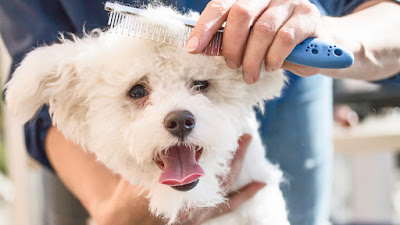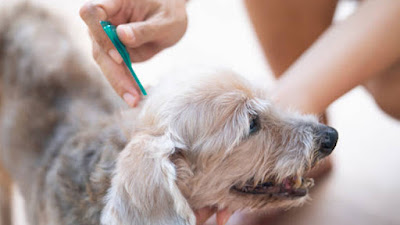Fleas are a common nuisance that can affect our beloved puppies. These tiny parasites can cause discomfort and irritation to our furry friends. Identifying the symptoms of flea bites on puppies is crucial in order to take prompt action and provide relief. By recognizing these signs, pet owners can ensure their puppies receive the necessary treatment to alleviate the discomfort caused by flea bites.
Identifying the Symptoms of Flea Bites on Puppies
Symptoms of flea bites on puppies can vary, but there are several common signs that can help pet owners recognize and address the issue. By being vigilant and observant, you can ensure the well-being of your furry friend.
One of the key symptoms of flea bites on puppies is the presence of tiny red bumps on their skin. These bumps are often clustered together and can be found on the abdomen, groin area, or armpits. If you notice these red bumps on your puppy's skin, it is likely a result of flea bites. Fleas feed on the blood of their hosts, leaving behind these characteristic marks.
Another symptom of flea bites on puppies is excessive chewing and licking. Puppies affected by fleas may constantly bite and lick their skin, especially in areas where fleas are more prevalent, such as the neck and around the base of the tail. This behavior is a result of the discomfort and itchiness caused by flea bites. If you observe your puppy engaging in excessive chewing or licking, it is important to investigate the possibility of fleas.
Flea saliva can cause an allergic reaction in some puppies, leading to dermatitis. Symptoms of flea bite dermatitis include redness, swelling, and the development of small, raised bumps or welts. These symptoms typically appear around the areas where fleas have bitten, and they can cause significant discomfort for your puppy. If you notice these signs of allergic reaction, it is essential to address the flea infestation promptly.
In severe cases, flea bites on puppies can result in anemia. Fleas feed on blood, and a heavy infestation can lead to excessive blood loss, especially in young and small puppies. Symptoms of anemia include pale gums, lethargy, weakness, and even collapse. If you observe these signs along with other symptoms of flea bites, it is crucial to seek immediate veterinary attention for your puppy.
By being aware of the symptoms of flea bites on puppies, you can take swift action to alleviate their discomfort and prevent further infestation. Regular grooming, flea prevention measures, and prompt veterinary care are essential to keep your puppy healthy and happy. Remember, a vigilant and proactive approach is key to protecting your furry friend from flea-related issues.
Dealing with the Symptoms of Flea Bites on Puppies
Recognizing the symptoms of flea bites on puppies is the first step in addressing the issue, but it is equally important to know how to effectively deal with these symptoms to provide relief for your furry companion.
If you notice your puppy experiencing discomfort and irritation due to flea bites, one of the first things you can do is give them a soothing bath. Use a mild, flea-repellent shampoo specifically designed for puppies, and carefully wash their entire body, paying close attention to areas where fleas are commonly found, such as the neck, back, and tail. This can help eliminate any fleas that are present on their coat and provide temporary relief from itching.
After bathing your puppy, it is crucial to thoroughly comb their fur using a fine-toothed flea comb. This comb can help remove any remaining fleas, flea eggs, or flea dirt from their coat. Remember to have a bowl of soapy water nearby to dip the comb in, as this will drown the fleas that are caught in the comb's teeth. Regular combing sessions can help control the flea population and prevent further bites.
Treating your puppy with a veterinarian-approved flea treatment is another important step in managing the symptoms of flea bites. Multiple choices are at your disposal, such as topical remedies, oral drugs, and flea collars. Consult with your veterinarian to determine the most suitable treatment for your puppy, considering factors such as their age, weight, and overall health. Following the prescribed treatment regimen is crucial to effectively eliminate fleas and prevent future infestations.
In addition to directly treating your puppy, it is essential to address the flea infestation in your environment. Fleas can live and reproduce in carpets, bedding, and furniture, so thorough cleaning is necessary. Vacuum your home regularly, paying special attention to areas where your puppy spends most of their time. Wash their bedding and any removable fabric items in hot water to kill fleas and their eggs. Consider using a flea spray or fogger in your home, following the instructions provided by the manufacturer.
By taking proactive measures to treat both your puppy and their environment, you can effectively deal with the symptoms of flea bites. Remember to continue monitoring your puppy for any signs of ongoing discomfort or infestation, and consult with your veterinarian if the symptoms persist or worsen. With proper care and treatment, your puppy can soon be free from the discomfort caused by flea bites and enjoy a healthy, flea-free life.
Prevention and Long-Term Management of Symptoms of Flea Bites on Puppies
While it is important to address the immediate symptoms of flea bites on puppies, prevention and long-term management play a crucial role in ensuring the well-being of your furry companion.
One of the most effective preventive measures is regular flea control. Consult with your veterinarian to determine the best flea prevention product for your puppy. Options may include topical treatments, oral medications, or flea collars. These preventive measures can help repel and kill fleas, preventing them from biting your puppy in the first place.
Maintaining a clean living environment is also essential in preventing flea infestations. Regularly vacuum your home, paying attention to areas where your puppy spends time. Wash their bedding and any fabric items regularly to eliminate any potential flea eggs or larvae. Additionally, keep your outdoor areas well-maintained and free from debris, as fleas can thrive in outdoor environments as well.
Regular grooming sessions are important for detecting fleas or flea dirt on your puppy's coat. Brush their fur regularly with a flea comb, paying attention to the areas where fleas are commonly found, such as the neck, back, and tail. If you notice any signs of fleas, such as flea dirt or live fleas, take immediate action to address the infestation.
Another aspect of long-term management is monitoring your puppy's overall health and well-being. Fleas can cause anemia in severe cases, so ensuring your puppy receives a balanced diet and regular veterinary check-ups can help maintain their overall health and immune system. A strong immune system can better defend against flea-related issues.
Educating yourself about flea prevention and management is crucial for long-term success. Stay informed about the latest flea control methods and products available in the market. Additionally, consult with your veterinarian for guidance on the most appropriate treatment options for your puppy's specific needs.
By focusing on prevention and long-term management, you can reduce the likelihood of flea bites on your puppy and minimize their discomfort. Remember to stay vigilant, implement preventive measures consistently, and seek veterinary advice whenever necessary. With proper care and attention, you can ensure that your puppy stays happy, healthy, and free from the bothersome symptoms of flea bites.




